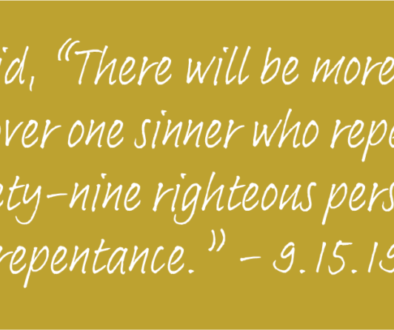September 22, 2019
The Eighteenth Sunday after Pentecost E. Bevan Stanley
September 22, 2019
Proper 20, Year C, RCL, Track 1
Jesus said, “No slave can serve two masters; for a slave will either hate the one and love the other, or be devoted to the one and despise the other. You cannot serve God and wealth.” In the name of the Father, and of the Son, and of the Holy Spirit. Amen.
This parable and the following saying are about as confusing as Jesus gets. At the risk of sounding like whining on the part of the preacher, I invite you to consider what he says. In the parable the hero is a manager, or steward, or chief executive who is stealing from the master. When he is dismissed, he tries to buy himself some friends by cooking the books and reducing the amount some of the master’s clients owe. He is a thief twice over. Then the master commends him for being so smart. This says volumes about the character of the master who values crafty greed over honesty. The first conclusion Jesus draws is that the children of this age, we would say those whose values are set by our secular culture, are more shrewd in dealing with secular matters than are the children of light, that is those whose values are aligned with God’s values. Then Jesus draws another conclusion: “Make friends for yourselves by means of dishonest wealth so that when it is gone, they may welcome you into the eternal homes.” It seems that Jesus is advising us to buy friends with money here in this life, so that these purchased friends may welcome us when we get to heaven.” The whole things seems pretty sleazy.
Then in the next paragraph, Jesus says, “Whoever is faithful in a very little is faithful also in much; and whoever is dishonest in a very little is dishonest also in much. If then you have not been faithful with the dishonest wealth, who will entrust to you the true riches? And if you have not been faithful with what belongs to another, who will give you what is your own?” Now he is talking about being faithful, not about stealing. It makes sense, but it seems to be the opposite of the lesson of the parable he just told about the man who was not faithful, but betrayed his trust.
Finally, he concludes with, “No slave can serve two masters; for a slave will either hate the one and love the other, or be devoted to the one and despise the other.
While it is certainly true that there is much in Scripture that is true at a level that is deeper than our understanding, God does expect us to use the minds God gave us as far as we can. Therefore, I invite you to go with me and see if we can make some sense of this passage. This will be a kind of Bible study.
First, it is possible that these are in fact three different sayings that Jesus uttered at different times, and which Luke, the author of this Gospel, chose to put together, because all three deal with the topic of money. If that is so, then we don’t have to see a logical or causal relationship among the three. Indeed, the first part, the parable of the dishonest manager, if taken alone, could be read as not really amount money at all. Maybe in its original form when Jesus spoke the words, it ended with the phrase, “The children of this age are more shrewd in dealing with their own generation than are the children of light.” Then the only point of the parable would be to contrast two different ways of being the world, the way of the world based on self-interest, self-protection, and fear, and the way of the Kingdom based on trusting God, generosity, and vulnerability. The moral of this parable could be understood as how two different people respond to crisis. The unrighteous manager faces a crisis when he is called to account. His solution is shrewd. The children of light or members of the faith community also face a crisis in the visitation of God’s prophet. Are they responding as shrewdly to their crisis as the manager is to his?
Why don’t we start with the easiest to understand, and the hardest to live: “You cannot serve God and wealth.” The biblical word is Mammon. It is not just money, but the whole idea of wealth as the source of security, worth, and power. Indeed, it is the name of an idol, the personification of wealth. This is very much like last week’s saying about having to hate one’s family in order to follow Jesus. It is not that either wealth or family are bad in themselves. In fact they are good. The Bible is clear that both are forms of blessing. The problem is when they compete in our hearts with that place which is rightfully God’s. We can enjoy wealth and use it for all kinds of good. This is what we mean by stewardship. Wealth may be a blessing, but we must not worship it or rely on it to be the source of blessing. Only God can be the source of our blessings.
St. Augustine articulated a very sound moral principle, when he said that every human being should be treated as an end and not as a means. That is, one must never treat a human being simply as the way to achieve some goal of one’s own. We must never use another. Jesus is saying here that exactly the opposite is true of money. Money must never be the goal or end, but must always be used as a means, or a tool. The very odd parable of Jesus’ first saying this morning makes that point. Money used for the good of others, can be an investment in one’s own soul. When we act generously, we become generous. What we sow here in this life, we will reap in the next—and may be in this life as well.
So, what is the bottom line here? (Since we have been talking about money and accounting, I guess it’s appropriate to use a financial metaphor!) The point to take home is simple—it usually is. We are to worship and serve God, and not money. We must never confuse the utility of money—for it is very useful—with the bounty of God. Money is a tool, a means of exchange. It is a way of storing the product of present labor for future use. It is a means to accomplish good for ourselves, our families, our neighbors, and our world. But we do not work, or labor, or give our lives to get money. We work for God’s mission of reconciliation in the world, and give our lives to that great purpose and adventure. Along the way, God may see fit to entrust us with money, or talents, or other resources to use for God’s purposes. Just as love, peace, joy, family, honor, and respect are to be enjoyed when they fall from God’s generous hand, so is money. Nor can any of these can be pursued as ends in themselves with out having them turn sour or become addictions.
So, my take on this odd passage is simply this: Jesus is often telling us in effect to keep our eye on the ball. Remember who God is and our relationship to God as beloved children. Then enjoy all God’s blessing, including money, as resources for God’s purposes. If we do that, we shall experience joy in both this world and the next.
Hurray for money! It’s great stuff. But it’s a tool not a master. And it can’t hold a candle to God.



